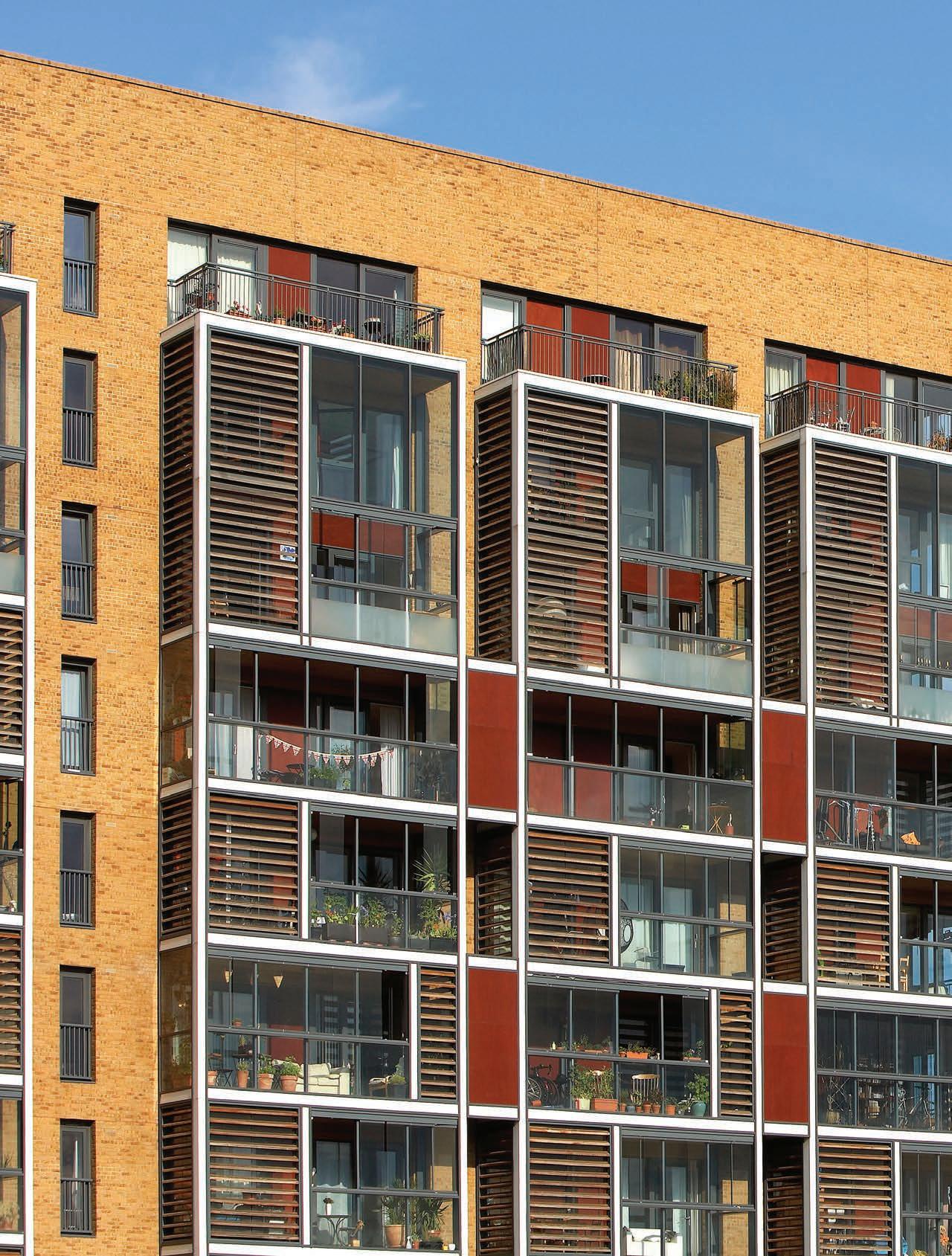
12 minute read
Hand in hand
Discussions surrounding sustainability generally focus on the reduction of carbon emissions, the responsible sourcing of materials together with the recycling and elimination of waste, which are all vitally important. But sustainability is about much more than the environment. Moving away from established practice requires people with new skills, understanding and att itudes. Education is a critical element in ensuring those entering the built environment are able to support the shift towards more sustainable systems and technology.
Evolving defi nitions
In 1987, the Brundtland Report for the United Nations said that for something to be sustainable it must: “meet the needs of the present without compromising the ability of future generations to meet their own needs”. Under this defi nition, sustainability can be said to encompass the social, economic and environmental needs of both present and future generations. It is this holistic defi nition of sustainability that is increasingly being applied to the construction industry in place of the nebulous and increasingly meaningless term green.
It is certainly the case that sustainability represents one of UK construction industry’s most important and challenging issues. In the policy paper Construction 2025: strategy, the government made it clear that it wants the UK construction industry to be a market leader in both effi ciency and sustainable construction. Its vision is for UK construction to be so effi cient and technologically advanced that it can lead the world in low-carbon construction. Key to realising this, the government says construction must invest in smart off -site manufacture and digital design and technology.
In this context modern methods of construction (MMC) – off -site manufacture, modular construction or good old pre-fabrication – stand up well against the people, profi t and planet triple bott om line defi nition of sustainability, with many att ributes that make off -site manufacture of buildings more environmentally friendly and productive. These include: Economic benefi ts such as faster construction and improved quality leading to reduced snagging and defects; there is also less dependency on the weather Social benefi ts such as improved health and safety of the workforce, improved working conditions and the opportunity
Do we really understand all aspects of sustainability and how is academia strengthening this emerging sector? Asks Andrew Pearson
to locate a factory in an area with a skilled workforce or for job creation Environmental benefi ts including reduced waste, reduced road traffi c movements from fewer site deliveries, improved operational performance because elements are likely to be produced in accordance with the specifi cation and design intent, and because factories can control the emissions that result from construction more eff ectively than construction sites.
As architect and TV presenter George Clarke notes: “It’s amazing how much more effi cient and bett er for the environment building off -site can be, yet in the UK less than 5% of construction uses off -site techniques, compared with around 9% in Germany, 12-15% in Japan and 20% in Sweden.” He also notes that off -site building can bring the cost of construction down, off er 30% quicker build time, and is one of the ways the industry can get to net-zero carbon emissions. “So it’s a crucially important area where we really need to be making change.”
Modernise or die
The need to invest in MMC to ensure the industry’s long-term sustainability was a message echoed in 2017 by Mark Farmer in his review of the UK Construction Labour Model, Modernise or Die. This highlighted the impact on the housing industry, in particular, of an ageing workforce and a reliance on on-site labour. The report said the case for change was compelling
in the uk less than 5% of construction uses off -site techniques, compared with around 9% in Germany 12-15% in Japan and 20% in Sweden


and called for modernisation through bett er productivity and harnessing technology to improve long-term margins, decrease unit delivery costs and create greater predictability by de-risking on-site delivery. The document’s 10 key recommendations included a call for government to: “Encourage the use of off -site construction to improve effi ciency and reduce the need for labour on site.”
Andy Goodwin, Managing Director of off -site design and build specialist B&K Structures, echoes Mark Farmer in saying said that one of the major issues facing the industry today is “an ageing workforce and the looming impact of Brexit”, and that the off -site industry has been, “hailed as the solution”.
Goodwin highlights the challenge of att racting, the brightest and best to structural timber technology in the UK and questions whether it is because “education providers are struggling to recruit off -site industry experts to teach the next generation of structural engineers?” To help resolve this issue, B&K Structures has formed partnerships with Nott ingham Trent University and Derby College with the manufacturer’s staff giving guest lectures to engage directly with students.
A more radical solution proposed by Goodwin is for contractor-led training programmes to form part of the planning obligation for contractors working on education projects. “We are familiar with

Section 106 Agreements ... these are oft en referred to as developer contributions ...putt ing back something into the community where the project is being delivered,” he says. He suggests guest lectures and contractor-led training programmes could form part of 106 Agreements for education builds. “By sharing our expertise, we will get the best opportunity to engage directly with students to promote the diverse range of career options available within the structural timber sector,” he adds.
University and industry
Cardiff Metropolitan University is already engaging directly with industry on sustainability issues through its involvement with industry-based research projects that feed into its BSc (Hons) Architectural Design and Technology degree, its BA (Hons) in Architecture and its BA (Hons) in Interior Design courses. “We try, where possible, to work with industry because it makes the teaching more relevant for the students when they work on live projects,” says Dr John Litt lewood, Senior Lecturer and Head of the sustainable and resilient built environment group (SuRBe) at Cardiff School of Art and Design.
One such initiative outlined is a three-year innovation project with JG Hale Construction/Seven Oaks Modular, a South West Wales-based building contractor and on-site manufacturer of timber-frame prefabricated and modular components. Here the university is working with the manufacturer to increase the thermal performance of their products, including the use of more natural materials for insulation, and to improve their processes to reduce costs (funded by Innovate UK and the Welsh Government).
“These types of research projects lead to examples and case studies that we incorporate into our teaching at
Sustainability is embedded into the Cardiff Metropolitan University’s design and built environment courses
undergraduate and at post-graduate level,” Litt lewood explains.
Another project is Home Grown Homes. This a project led by Wood Knowledge Wales, a body established to promote the use of locally sourced Welsh timber for structural use and in the manufacture of cladding, windows, doors and even for insulation. For this project, the university is involved in a package of assessing building performance related to timberbased projects across Wales.
The university’s involvement with manufacturers generally results from a business approaching academia with an issue that it needs help in resolving. “The problems tend to be around sustainability and/or building performance because that is what the SuRBe group’s expertise is in, and those projects then feed into our teaching.” Once approached, the university can use its connections to source other funding streams and to engage with potential project partners. “Generally, research and innovation projects are funded in part by industry and then we will help source other types of funding to go alongside that,” he adds.
It exemplifi es how academia is helping to strengthen sustainability as an emerging sector in the construction industry, and it’s a reciprocal relationship. Each time an organisation approaches a university with an issue that needs resolving, the research and innovation involved provides an opportunity for students to get hands-on experience in industry and alerts manufacturers to the potential of sustainable applications. It also helps improve and promote sustainable construction practices in the wider industry.
Alongside its usance in industrial projects, sustainability is embedded into the Cardiff Metropolitan University’s art, design and built environment courses. Within Cardiff School of Art and Design, sustainability is part of theory teaching through a module called Constellation, which is taught by 20 diff erent members of staff . “I’m lecturing sustainability considerations to a range of students including architectural technologists, product designers, fashion designers and ceramicists,” says Litt lewood.
At the University of Wolverhampton, however, sustainability is taught as a defi ned module on the degree level Construction Management course. “When you are talking sustainability you are talking materials, process, product and technology. We look at a project and try to assess what are the most sustainable technologies, what are the most sustainable processes and which materials are the most sustainable,” says Dr Emmanuel Daniel, Senior Lecturer in Construction Management and Course Leader for the MSc in Off site Housing Construction.
The content of the courses is agreed with the professional bodies that validate the courses, such as CABE and CIOB, which happens every fi ve years. “Professional bodies understand what is needed by industry,” he says. It is the social element of sustainability and how a construction project impacts the local community that holds a particular interest for him. This might include whether

a project sourced its materials locally or took on apprentices from the local community. “We’ve done some work with Highways England looking at how their supply chain is delivering social value across their projects, it’s what we call social sustainability,” he says.
Daniel also teaches on the University of Wolverhampton’s MSc course on Off -site Housing Construction. “At the master’s level, we teach the principle of sustainability through the design and construction of off -site products,” he says. One of the contributors to the course is education and training charity MOBIE.
Education initiatives
George Clarke founded the Ministry of Building Innovation and Education (MOBIE) in 2017 to train and inspire young people to innovate in the design and construction of homes in the UK and abroad. According to Gerry Ruffl es, Head of Education at MOBIE, the charity is about trying to bring the homebuilding industry into the 21st century in order to make it effi cient and sustainable. “We’re still building houses the same way today that we have for hundreds of years; it’s slow, it’s ineffi cient and it’s not particularly sustainable from an environmental and social point of view,” he says.
Ruffl es says that while many industries have adapted to digital technologies, construction has not. “It’s wrong in this day and age that when you buy a new home you have a snagging list a mile long, whereas if you were to buy a brand new car you would not expect to be trailing backwards and forwards to the dealership with problems. It is all down to a failure of the homebuilding industry to engage with modern methods of construction and off - site manufacture, which was why MOBIE was set up,” he explains.
MOBIE has a mission to disrupt the homebuilding sector by att racting and nurturing a new cohort of designers, makers and integrators to reshape the housing industry. In short, it seeks to embrace all aspects of sustainability, and its aim is not so much to strengthen the emerging sector within construction, it is to drive it.
To do this it has created an educational pathway through developing a series of courses, from BTEC through to postgraduate, in advanced home design, manufacture and construction. Its fi rst MSc in Advanced Home Futures at the University of Teesside commenced in 2018, but it also provides courses at the University of Wolverhampton.
Its BTEC and HNC/D courses, which are provided in association with Pearson, are available to colleges around the country Ruffl es says MOBIE is currently working with CABE to produce a Level 7 postgraduate standard to enable people to do master’s degrees using the training levy. Sustainability does not feature as a specifi c entity in any of the courses because it is ingrained in everything MOBIE does, says Ruffl es. “I don’t think anybody would teach construction technologies and techniques and BIM without incorporating sustainability now.”
Training the trainers
A sign of MOBIE’s intent to drive change through the industry is its launch of Off site Ready, a programme developed to train the trainers funded by the Construction Industry Training Board. “One of the issues with off -site construction is that the technologies are changing so fast that there were concerns that a lot of academic institutions were going to be challenged to teach these things, particularly on vocational courses,” Ruffl es explains. “For the train the trainers programme, the project partners have created 10 modules looking at all aspects of off site to provide tutors with a complete set of materials including class projects and assignments,” he adds.
Perhaps universities are preaching to the converted. At the University of Wolverhampton Daniel says that the concept of sustainability and off -site is starting to become inherent in construction. “I have 10 students working on their BSc dissertations, some of which are part time and working in industry, and I think 70% of them are looking at issues around sustainability and off -site construction because it matt ers to them.” There’s litt le doubt that academia is helping support sustainability in construction, but it’s the students themselves that are leading that.
In some respects, the industries that are needed to meet the UK’s climate change goals remain in the early stages of development. This is true as much for MMC as it is for the household and commercial refi t projects needed to bring the UK’s existing stock up to zero-carbon standards. But what is becoming clear is that by working together, the potential for industry and the academic sector to accelerate this development is vast, and that it’s the students themselves who are embracing the possibilities.
For more information on any of the courses discussed here, visit MOBIE.org.uk/courses cardiff met.ac.uk/artanddesign wlv.ac.uk











